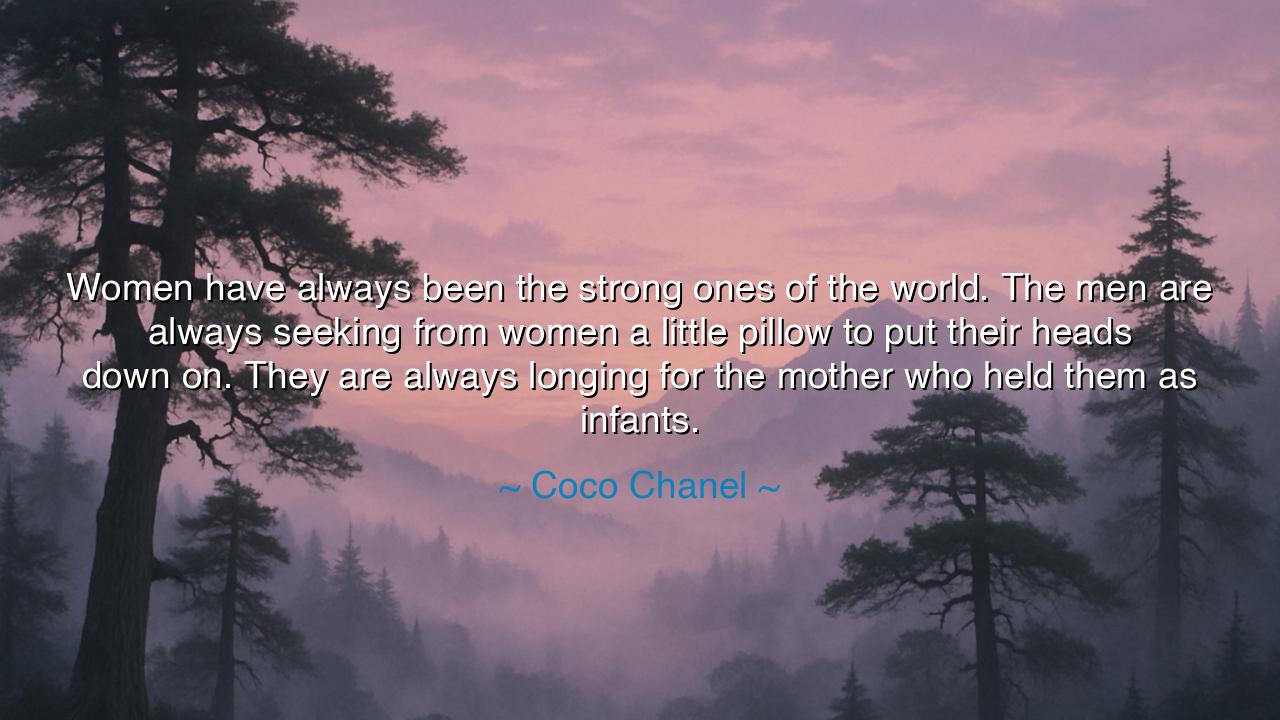
Women have always been the strong ones of the world. The men are
Women have always been the strong ones of the world. The men are always seeking from women a little pillow to put their heads down on. They are always longing for the mother who held them as infants.






Coco Chanel, the woman who remade fashion and defied the chains of her age, once declared with piercing insight: “Women have always been the strong ones of the world. The men are always seeking from women a little pillow to put their heads down on. They are always longing for the mother who held them as infants.” These words unveil not merely the dynamics of love, but the eternal structure of human strength and dependence, of nurture and longing, of the balance between the seen and unseen powers of the world.
The meaning of this saying rests in the recognition that true strength is often quiet, hidden beneath gentleness, woven into the fabric of daily sacrifice. Chanel reminds us that women—though denied glory in battlefields and councils for much of history—have carried the heaviest burdens: the bearing of life, the raising of children, the sustaining of homes, the quiet endurance through sorrow and want. Where men sought the pillow of comfort, it was women who provided it. Where men sought reassurance, it was the memory of the mother’s arms, the earliest sanctuary, that shaped their longing. Thus, the strength of women is not the strength of noise or conquest, but of constancy, compassion, and unyielding resilience.
The origin of Chanel’s insight may lie in her own life. Orphaned and hardened by poverty, she knew firsthand the power of a woman to survive and rise from despair. She lived in a world that told women they were weak, yet she saw clearly that it was men who often sought refuge in women’s presence, who leaned on them in times of weariness. From this truth, she spoke: not to belittle men, but to expose the illusion that they alone were strong. She saw that men’s longing for the mother was a thread woven through their lives, shaping even their desires for companionship, love, and comfort.
History itself confirms this truth. Consider the mothers of Sparta, who told their sons to return “with their shields or upon them.” Their steel of heart made warriors possible. Or recall Eleanor Roosevelt, who stood as a pillar beside Franklin, sustaining him through paralysis and war, becoming the backbone of his strength. Even in the lives of kings and conquerors, from Alexander to Napoleon, there was often a woman in the shadows, bearing the weight of their humanity, giving comfort when the world demanded too much of them. These are not exceptions—they are the rule, though history often chooses not to record them.
Yet Chanel’s words also reveal a deeper paradox. While society praised the strength of men, it was women who bore the responsibility of sustaining that strength. Men sought in women not only physical comfort but the return to the first love—the unconditional embrace of the mother. The cradle became the eternal symbol of solace, and men, no matter how far they marched or how high they rose, carried in their hearts a longing to rest once more upon that sacred pillow. Women, then, are not merely companions, but anchors, connecting humanity to its first taste of love and safety.
O children of tomorrow, heed this wisdom: do not mistake silence for weakness, nor compassion for fragility. The strongest among us are not always those who wield the sword, but those who sustain the hand that wields it, who offer rest, comfort, and healing to the weary. If you are a man, honor the strength of women, not only in words, but in deeds. Recognize the burdens they bear, and do not take their sanctuary for granted. If you are a woman, know that your gentleness does not diminish your power; it is itself the mark of your greatness.
Therefore, the lesson is clear: cherish and respect the unseen strength that flows from nurture, compassion, and love. Understand that while men may seek the pillow, it is the courage, endurance, and devotion of women that make such solace possible. Build a world where this truth is honored openly, where the strong are not defined by their noise, but by their endurance, their constancy, and their power to sustain others.
Thus, Chanel’s words remain as a testament across ages: “Women have always been the strong ones of the world.” Let them remind you that behind every triumph stands the quiet strength of those who carried, comforted, and endured—and that this strength, though often hidden, is the very foundation of humanity itself.






AAdministratorAdministrator
Welcome, honored guests. Please leave a comment, we will respond soon